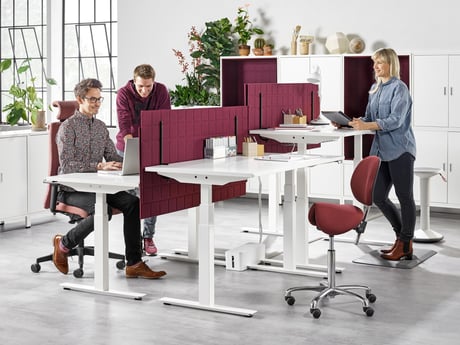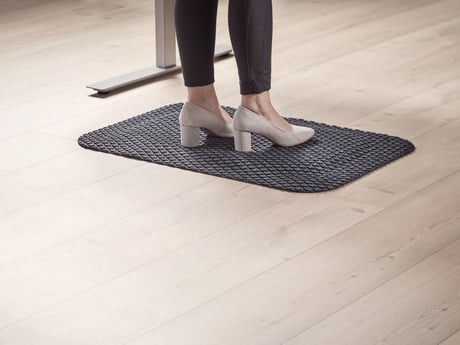10 ways to hold more productive meetings

We’ve all sat in meetings at work that seem like they’ll never end and then left feeling like nothing has been achieved. Ineffective meetings are estimated to cost UK businesses £191bn a year: an average cost of over £35,000 per business ¹. However, that doesn’t mean that we can do without meetings altogether. What are the best ways to keep your meetings focused, productive and on schedule?
1. Make an agenda and stick to it
By setting an agenda and distributing it in advance, everyone attending knows what will (and will not) be discussed and can come prepared. Sticking to your agenda will keep the meeting on topic and save time. If something important comes up that is not relevant to your current discussion, schedule another time to talk about it.
2. Only invite people who need to be there
Only invite employees that can contribute to the discussion or need to hear what’s going on in order to do their job. Cutting down on the number of participants means that everyone in the meeting will be engaged with the topic and able to make productive contributions, which keeps the discussion on track and avoids wasting time. It also prevents staff who don’t need to attend wasting time that could be spent on other work.
3. Involve participants
Staff will be more engaged with the meeting if they have a chance to participate and give their opinions. Make sure your meetings don’t become lectures. Where appropriate, give everyone a platform to contribute and feel like a valued member of the team.
4. Check that the conference room suit your needs
Make sure the room where you intend to hold your meeting is suitable. Is the meeting table big enough? Does the room have enough conference chairs? Conversely, if there are only a few people attending, is the room too big? You’d be surprised by what a difference the conference room furniture can make to the atmosphere; trying to have a casual team catch up around a boardroom table will throw off the flow. By checking on these things in advance, you save the five to ten minutes at the beginning of each meeting that people spend settling in and make your meeting more productive.
5. Test the technology beforehand
Spending a couple of minutes checking that all the technology is working ahead of your meeting can save a lot of time, both for in-person meetings and virtual ones. If you’re running the meeting, get there early to set up and connect. This means that when your team arrives, you can get started straight away.
6. Ban mobile phones
Mobile phones are a major source of distraction in meetings. What’s more, if just one person is looking at their phone, it will throw off the dynamic of the whole group. Without phones, people focus, relax and talk to each other more, which leads to a more productive meeting and creates better relationships.
7. Try a standing meeting
Did you know that, on average, meetings last 34% longer when participants are sitting down than when they are standing up? ² With a sit-stand meeting table, you can easily hold productive stand-up meetings that are short and to the point. As an added bonus, standing has also been shown to encourage collaboration and improve engagement ³.
8. Change the scenery
A new setting can engage staff and inspire fresh ideas. Try going to a local coffee shop for team catch ups or hiring a venue for important meetings. If you want to go further still, hold a walking meeting and get outdoors. Remember to let everyone know in advance so they can come prepared and enjoy the experience!
9. End the meeting with a clear focus
At the end of the meeting, be clear about what has been achieved and what responsibilities people have going forward. Send a recap e-mail afterwards to sum up the key points; include a breakdown of any tasks that need to be completed with deadlines so that everyone knows what is expected of them.
10. Cut out unnecessary meetings
Research shows that 70% of office workers believe there are too many meetings in a working week and 45% think meetings prevent them from getting on with their job ¹. Make sure you only hold meetings when necessary so that your team knows they are important and doesn’t dread wasting time that could be better spent on their own work.
By keeping your meeting on track, you can achieve more in a shorter period of time, leave the team feeling more motivated and save your business money.
Sources
- London Loves Business (2018) Unnecessary meetings costing UK business more than £191bn a year [online] https://londonlovesbusiness.com/unnecessary-meetings-costing-uk-business-more-than-191bn-a-year/ [accessed October 2018]
- Dahl, M. (2014) "Work Smarter: Meetings Are 34 Percent Shorter If You’re Standing Up" The Cut [online] available from: https://www.thecut.com/2014/05/work-smarter-for-shorter-meetings-stand-up.html [accessed February 2018]
- Lehman, S. (2014) "Standing meetings may improve group productivity" Reuters [online] available from: http://www.reuters.com/article/us-psychology-group-meetings-productivit-idUSKBN0EV29V20140620 [accessed February 2018]



